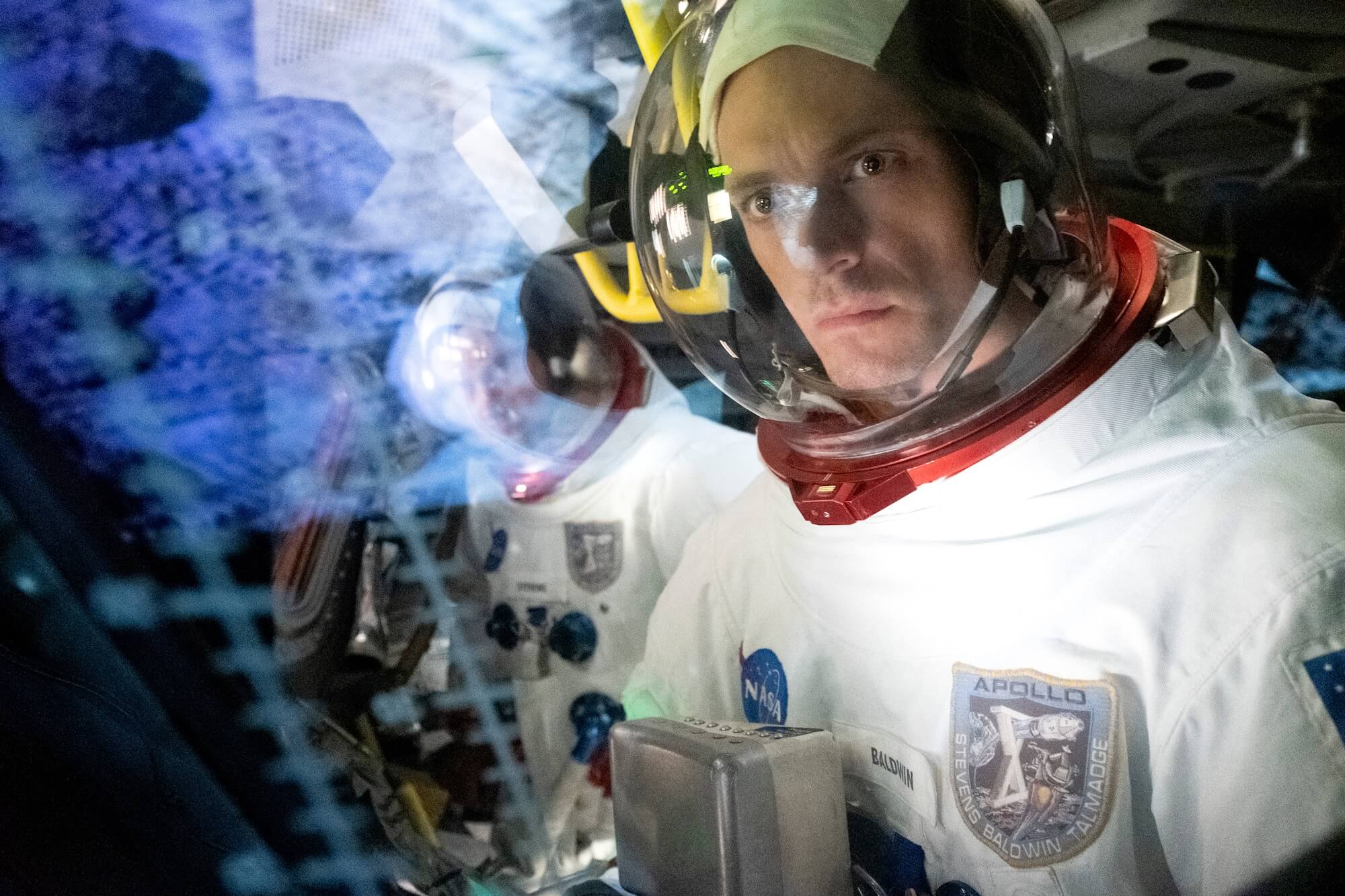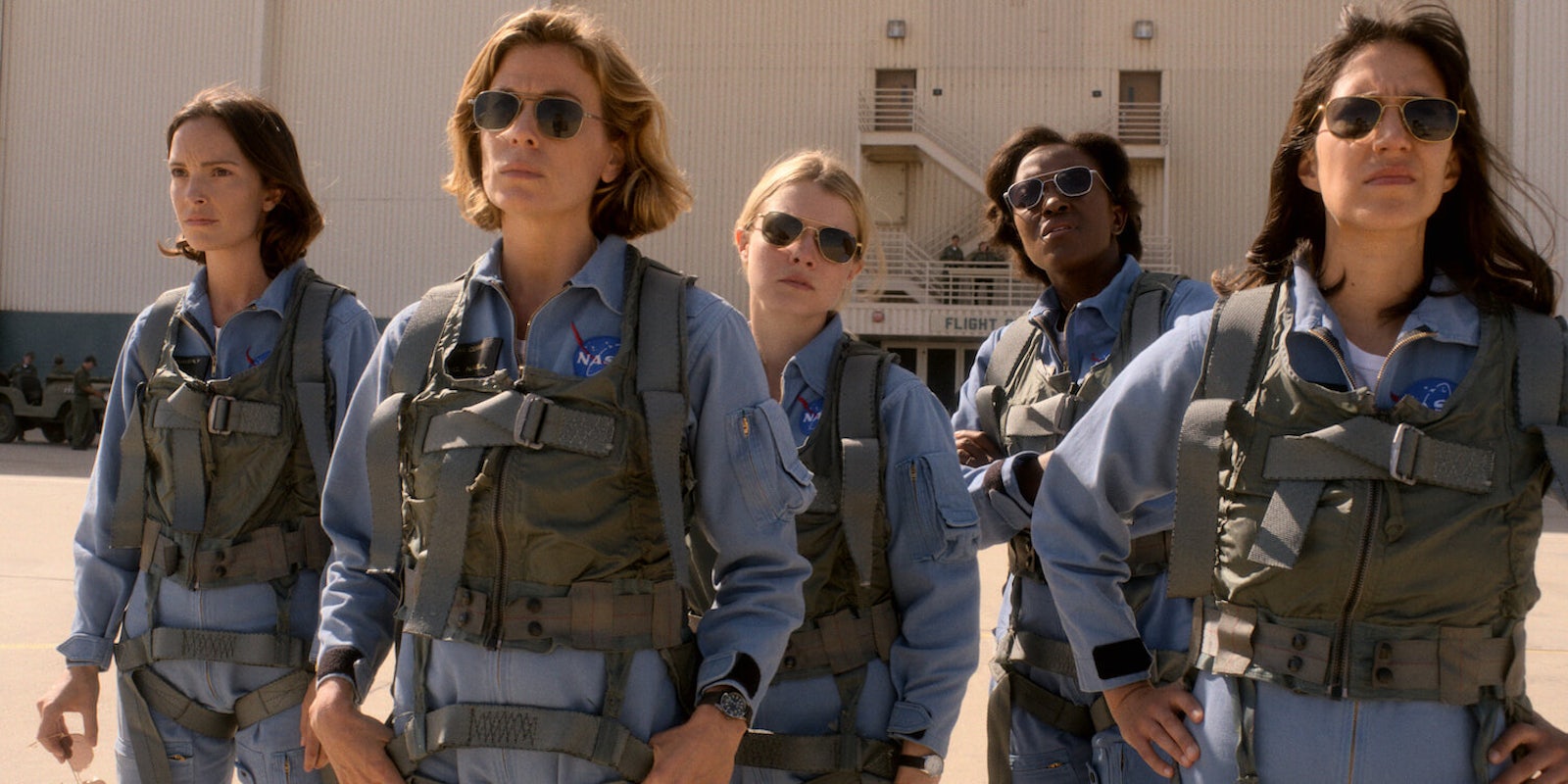On July 20, 1969, Neil Armstrong set foot on the surface of the moon. The mission to the moon, NASA’s eleventh Apollo flight, was being followed by awestruck television viewers across America and the world; cameras captured Armstrong descending to the moon’s surface and relayed the footage of him uttering the now-famous words, “That’s one small step for a man, one giant leap for mankind,” to news stations back home. Soon thereafter, viewers watched President Richard Nixon speaking to Armstrong and fellow astronaut Buzz Aldrin from the Oval Office in split-screen. “This certainly has to be the most historic telephone call ever made ever made from the White House,” the president remarked.
CREATORS: Ronald D. Moore, Matt Wolpert, and Ben Nedivi
STREAMING: Apple TV+
‘For All Mankind’ sets out to depict an alternate history version of the moon landing, but it doesn’t offer much commentary on the seminal era of space travel—or the women’s movement.
The fiftieth anniversary of the moon landing has revived interest in the history of the space program and the Apollo 11 mission; this year has seen the publication of several new books on the space race and the moon landing, as well as the hit documentary Apollo 11 and For All Mankind, a new television program that arrived on Apple’s new streaming service, Apple TV+, on Nov. 1. Celebrated science fiction television writer Ronald D. Moore, of Battlestar Galactica and Outlander, has envisioned an alternative history for the space race beginning with the first moon landing. In For All Mankind, the Soviet space program—which in reality never made it to the moon—beats the Apollo 11 mission by a month; instead of Armstrong, the first man on the moon is a Soviet cosmonaut, who announces, “I take this step for my country, for my people, and for the Marxist-Leninist way of life, knowing that today is but one small step on a journey that will take us all to the stars.”
This development sets the American space program on a decidedly different course than it took in reality. While NASA moved away from moon missions after Apollo 17, in 1972, the presence of the Soviets on the moon raises military concerns that reflect the broader ethos of détente that governed Cold War politics; if the Soviets are considering militarizing the moon, the military argues in For All Mankind, or even building a permanent base there, the United States can’t fall behind, if only to prevent them from doing harm. Before the Apollo 11 mission departs, flight director Gene Kranz (Eric Ladin) delivers a sober, heartfelt speech to the control room, telling them, “Today is about the future of our country—the future of the world.” If they fail, “the future will belong to the Soviet Union.” The Soviets do appear to have a head start on the future: when they land a female astronaut on the moon, NASA has to rush to fast-track a female astronaut program of their own in order to appease the president and the public.

For All Mankind follows several established male astronauts, their wives, and female astronaut candidates who participate in NASA’s fast-tracked program. Ed Baldwin (Joel Kinnaman), who flew on the preparatory Apollo 10 mission, is the laconic center of the show, a capable astronaut who chafes under authority and is desperate, like all the other astronauts at NASA, to go to the moon. His shrewish wife Karen (Shantel VanSanten) lives through his successes and failures; the same cannot be said for Tracy Stevens (Sarah Jones), the ex-pilot wife of horndog astronaut Gordo Stevens (Michael Dorman). A flattering photo in an old profile of the Stevenses in a magazine catches President Nixon’s eye, and he requests that she be invited to participate in NASA’s training program—she has, the middle-men explain to manager Deke Slayton (Chris Bauer), the right look.
For All Mankind runs into difficulties almost immediately. It fails at its most basic task: convincingly recreating its historical period. Everything is a little too glossy, a little too modern. The astronauts drive pristine sports cars; their wives look like they dressed up as sixties housewives for Halloween. Mission control looks like a model that was put together out of a box. The show suffers from comparisons to Apollo 11, which features extensive footage from inside mission control during the Apollo 11 flight. That film captures the unglamorous reality of the space program as well as the transcendent glory and death-defying hubris of the Apollo 11 mission. For All Mankind fails to capture either the aesthetic look of the place and time or the sense of heart-pounding suspense the real events elicited. In the show’s version of Apollo 11, the astronauts crash land, their fate temporarily uncertain; this fabricated crisis is considerably less compelling than the real-life mission, which went off without a hitch.
But the show’s problems run deeper. As I watched, I repeatedly asked myself: What is the point of all this? What does the show have to say, really, about history? It has no new insights on the Cold War, or the Soviets, who remain a faceless, threatening presence off-screen. And its depiction of female astronaut candidates lacks bite. Though Nixon’s attitude toward the program is appropriately cynical, the show fails to reckon with the reality of the highly divisive women’s movement, or with the more granular experience of sexism. Several of the men who work at NASA chafe at the introduction of female astronaut candidates, but they all come around to the idea, and even defend their female colleagues against criticism. This rosy depiction of discrimination is particularly egregious in the case of Danielle Poole (Krys Marshall), the single Black candidate, who miraculously escapes the scourge of racism almost totally. Though she occasionally mentions the fact that she is the program’s token Black candidate, her colleagues universally accept her. A successful revisionist history must fully engage and reckon with the historical realities of its period; instead, this show bypasses the ugliness of racism and sexism in favor of an idealized vision of cooperation and acceptance.
By far the most engaging character on the show is a female candidate called Molly Cobb (Sonya Walger), who unfortunately only appears in a handful of episodes. Molly participated in an earlier training program for women that was shut down prematurely, and is, as one man delicately puts it, “rough around the edges.” She is, in other words, butch, and does not suffer fools. She and another candidate from the earlier program, Patty Doyle (Cass Buggé), have a warm rapport, but she has no time for the younger recruits, Tracy especially, whom she feels has not earned her place in the program. Molly is a breath of fresh air in a show full of characters who are, basically, nice. Walger stands out, too; her performance is nuanced, vivid, and affecting in a way that transcends the material. Molly’s desperate desire to go to space, and her fear that her opportunity will once again be taken away from her, has rendered her acerbic and bitter; she is unconcerned with the opinions of others in a way that is thrilling to watch but also a little sad. A better show would have delved deeper into this kind of messy, complicated behavior. Instead, For All Mankind strives to be inspiring and unobjectionable, and winds up feeling like the shadow of what might have been.
https://www.youtube.com/watch?v=N3RjayAF0b4
Apple TV+ launched on Nov. 1 with a robust library of movies and series. Here’s everything we know about the service.
Update 5pm CT, Nov. 5: This post was updated to reflect the correct date of the Apollo 11 moon landing.


